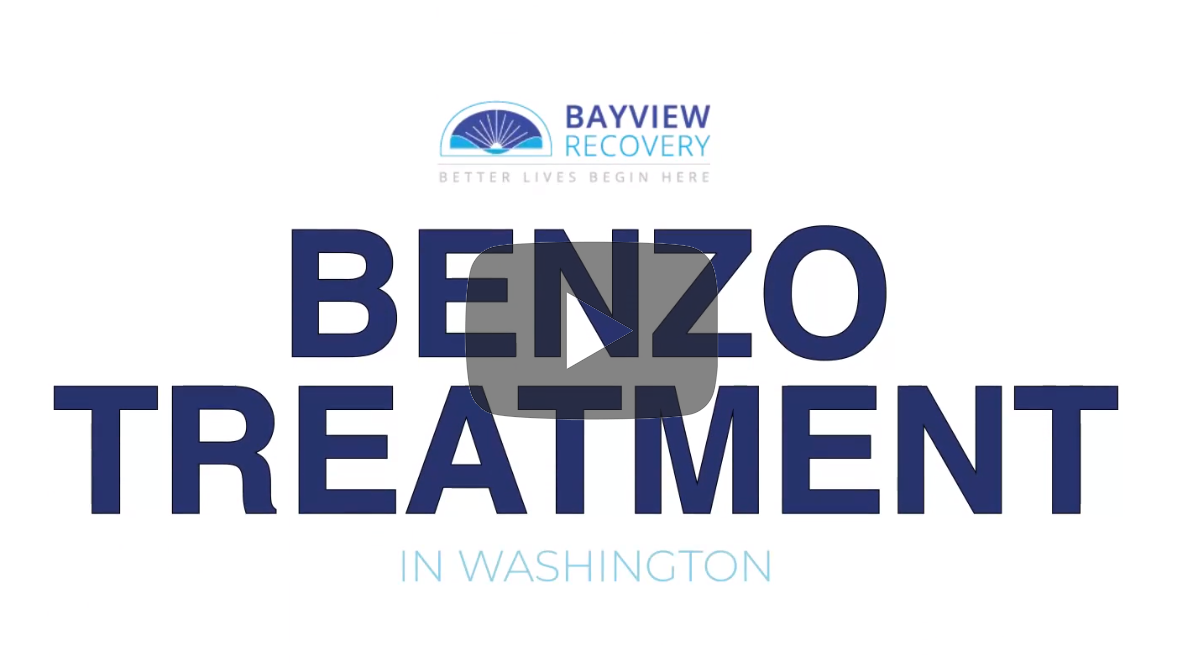Benzo Addiction Treatment in Tacoma, WA
Benzodiazepine use among U.S. adults continues to rise. Of those prescribed benzos, nearly 20 percent of people abuse the drug and develop a benzodiazepine dependence. These drugs produce calming and soothing effects causing many people to become addicted.
Substance use disorder, or addiction, is a complex chronic disease. Benzo addiction adversely impacts relationships, careers, and mental and physical health. At Bayview Recovery Center, our treatment for benzo addiction in Washington combines evidence-based and holistic therapies to help people achieve lifelong recovery. Whether it’s benzo addiction, or addiction to any other substances, we offer individualized addiction treatment programs in Tacoma, WA.


What are Benzodiazepines?
Benzodiazepines, or benzos, are a class of drugs that treat a variety of conditions, including anxiety and insomnia. Doctors also prescribe benzos to minimize seizures and reduce alcohol withdrawal symptoms.
When benzos are taken short-term, and as prescribed, they are relatively safe. However, when taken long-term, even as prescribed can lead to benzodiazepine addiction. The most commonly prescribed benzos include Xanax, Klonopin, Valium, and Ativan.
Why is Benzo Addiction Incredibly Strong?
Benzodiazepines belong to the CNS (Central Nervous System) depressant drug catagory. They work by binding to the brain’s GABA (gamma-aminobutyric acid) neurotransmitter receptors. As a result, it slows brain activity and simultaneously causes anxiety and seizures.
What makes a benzodiazepine addiction so incredibly strong? It is how quickly the body and brain develop a tolerance to the drug, which requires larger doses to achieve the same effects. Regularly using benzos teaches the body that this drug is the only way to relax. Without benzos, people become increasingly irritable and tense.
It can be easy to rationalize misusing benzodiazepines since their doctor prescribes them. Unfortunately, doctors are quick to prescribe benzos which encourages benzodiazepine addiction. Benzos are a first-line traditional treatment for Generalized Anxiety Disorder, with around 150 million prescriptions written over the years.
Prescription benzodiazepines come in three types which include:
- Ultra short-acting benzos – take effect the most rapidly and are used to treat insomnia and are a part of pre-surgical anesthesia
- Short-acting benzos – has rapid effects but a short-lived effect, helpful in treating anxiety
- Long-acting benzos – release active ingredients slowly for longer-term relief, commonly used to treat anxiety, seizures, and insomnia
What are the Common Benzodiazepines?
Benzos differ in how quickly the body absorbs them, their potency, and their uses, but they are all addictive. Common benzodiazepines used for physical and mental health services include:
- Xanax (alprazolam) – Xanax treats anxiety and panic disorders and comes in various strengths. Extended-release Xanax is designed to release the medicine over time. However, if a person crushes and snorts it, they get the whole dose at once. This makes it the most dangerous benzo on the market which can lead to overdose or intense withdrawal symptoms.
- Klonopin (clonazepam) – Panic and seizure disorders are often treated with Klonopin. It comes in 1 mg and 2 mg pills. Some pills are made to dissolve in the mouth. Klonopin is an intermediate-acting benzo and easily can result in physical dependence.
- Valium (diazepam) – Valium is often prescribed to treat anxiety disorders, muscle spasms, and alcohol withdrawal symptoms. It is one of the oldest benzos on today’s market. Valium has multiple generic forms and different strengths, including extended release. Valium is less rewarding than other benzos because it takes a long time to hit the body.
- Ativan (lorazepam) – Ativan is typically used to treat panic disorders. While it typically comes in pill form, it is available in injectable form. It has a short-to-intermediate onset, which could give some users a big reward.
- Ambien (zolpidem) – Ambien is a hypnotic drug used to help people sleep through the night. It has a sedating impact which allows people to fall asleep, and other ingredients to help people forget what happened while they slept. Ambien has a fast onset and doesn’t typically lead to benzodiazepine addiction since people fall asleep before taking another dose.


Who Can Become Addicted to Benzos?
Benzos are habit-forming sedatives, and anyone who takes them is at risk of addiction. According to the Drug Enforcement Administration benzos are prescribed so often that 66 million people left doctor’s offices and hospitals with a benzodiazepine prescription. Additionally, experts believe several factors increase the chances of developing a substance use disorder.
Genetics plays a role in a person’s risk of developing substance abuse. People whose parents or close family members struggle with addiction are more at risk of substance use disorder themselves.
Genetics contribute to the development of addiction by altering:
- How a person responds to stress
- How likely a person is to engage in risky behaviors
- The risk of developing a mental health disorders
- Whether drugs are pleasurable or not
- How long drugs stay in the body
Benzo abuse isn’t limited to those with prescriptions. Teens and young adults may receive benzos from friends or grow up in an environment with benzo abuse. Many studies show teens and students are at a higher risk of developing a Xanax addiction, and adults ages 18-25 are abusing benzos at higher rates than before.
The calming effects of benzos are attractive to students dealing with academic stress. Similarly, teens living a chaotic lifestyle or in a chaotic environment may abuse benzos to cope. At the same time, people who experience trauma may succumb to benzodiazepine misuse to numb their mental and emotional pain.
Some people who struggle with benzodiazepine addiction have untreated or undiagnosed mental health disorders. Benzos can ease anxiety symptoms, so people are often prescribed benzos for their anxiety disorders. However, people can quickly build a tolerance to the drug and require higher doses to achieve the same effects.
People struggling with post-traumatic stress disorder (PTSD) or depression may use benzos for their euphoric effects. These effects help them escape from their PTSD symptoms. More than one in four adults struggling with substance use disorder have co-occurring mental health disorders. Effective benzo addiction treatment for benzo addiction simultaneously treats mental health disorders.
What are the Signs of Benzo Addiction?
Since benzos are highly addictive, it’s crucial to know the signs of addiction if a loved one is using them. The earlier a person receives substance abuse treatment for benzo addiction, the easier it will be to achieve lasting recovery.
Some of the physical, psychological, and behavioral symptoms of benzo abuse include:
- Drowsiness
- Weakness
- Blurred vision
- Poor judgment
- Being secretive
- Doctor shopping
- Asking friends and family for their benzo pills
- Mood changes
- Risk-taking behaviors
- Withdrawal from friends and family
- Combining benzos and alcohol or other drugs
Signs of Benzodiazepine Overdose
People overdose when they take larger doses of benzos than their bodies can handle. Without immediate medical attention, it can lead to death. In 2020, there were 12,290 overdose deaths involving benzos.
Signs of benzo overdose often include:
- Confusion
- Slurred speech
- Extreme drowsiness
- Slowed or shallow breathing
- Uncoordinated movements
Because a person quickly develops benzodiazepine dependence and builds a tolerance to benzos, withdrawal symptoms will begin if they miss a dose or stop taking the drug. Benzodiazepine withdrawal syndrome can be dangerous and even life-threatening. Treatment for benzo addiction typically begins with medical detox to ensure a safe and comfortable experience.
Benzodiazepine Withdrawal Symptoms
Withdrawal for benzos can be extremely dangerous. It can provoke strong panic attacks, and other symptoms benzos are meant to treat. Signs of benzo withdrawal include:
- Extreme anxiety
- Hallucinations
- Headaches
- Insomnia
- Nerve spasms, numbness, or itchiness
- Heavy sweating
- Heart palpitations
- Gasping for air
- Seizures
- Cravings
Benzo withdrawal can take about a week. But, many people who try to detox without professional help often return to using benzos when the symptoms become too intense especially if they have acquired protracted withdrawal symptoms. Seeking benzo addiction treatment in Washington can help a person successfully detox.
The Importance of Benzo Detox
After a person admits they have a benzo addiction and need help, the next step is getting into a medical detox program. A medical detox program helps people safely rid the body of toxins while minimizing benzo withdrawal symptoms.
Quitting benzos cold turkey is extremely dangerous and can sometimes be fatal. Medical detox provides constant medical supervision to monitor for life-threatening symptoms, including seizures and suicidal behaviors.
According to the Diagnostic and Statistical Manual of Mental Disorders, 5th Edition, grand mal seizures may occur in 20-30 percent of people undergoing unsupervised benzo detox. Because medical detox reduces the discomfort of benzo withdrawal, it simultaneously reduces the risk of relapse.

Benzo Detox Medications
Detoxing from benzos often involves tapering down the dose to less potent benzos. Diazepam (Valium) and cloazepam (Klonopin) are often the benzos used in detox. These drugs are long-lasting and less powerful than other benzos and reduce withdrawal symptoms.
Other medications are used in detox to help relieve benzo withdrawal symptoms, including:
- Buspirone
- Flumazenil
Detox is not a treatment for benzodiazepine addiction. It is a crucial step in treatment, but the risk of relapse is extremely high without treatments such as psychotherapy. There are various treatment programs to meet everyone’s personal and addiction needs, such as intensive outpatient and partial hospitalization programs.
Bayview Offers Holistic Styles of Treatment for Benzo Addiction in WA
The benzo epidemic continues to wreak havoc on people in Washington and all across the country. Philadelphia alone had over 1200 overdose deaths in 2020, increasing by 10 percent in 2021. Holistic benzo addiction treatment in Washington can help you or a loved one recover from this horrible disease.
At Bayview Recovery Center, we believe recovery involves improving a person’s overall well-being. This includes not just their physical health but their mental and emotional health as well. Holistic therapies such as mindfulness, meditation, and yoga.
People rely on medications to control their anxiety and depression. But, being mindful, meditating, and practicing yoga can reduce panic attacks and help you feel in control of situations.
What Treatments Does Bayview Offer?
After completing a detox program, it is crucial to go straight into a treatment program. With benzo addiction, there can be lasting withdrawal symptoms. Our medication-assisted treatment (MAT) helps you stay on the road to recovery and is part of our comprehensive treatment programs if necessary.
At Bayview Recovery Center, your personalized treatment plan may include programs such as:
- Dual Diagnosis
- Partial Hospitalization Program (PHP)
- Intensive Outpatient Program (IOP)
- Outpatient treatment
- Sober living
Psychotherapy and group therapy are crucial aspects of both addiction and mental health disorder treatment. It helps people heal from past mistakes and set goals for the future. Group therapy reminds people they are not alone. In therapy, people offer support and receive support from others in recovery.

Start Your Recovery Journey Today With Bayview Recovery
If you or a loved one is struggling with an addiction, help is waiting for you. At Bayview, our holistic and innovative approach can get you on your road to lasting recovery. Contact us today to find out more.
“The staff at the center has been remarkable in their care for our loved one. Tuni was with us the whole way as we tried to get this person into treatment. They continue to assist us as the process continues. Great work!”
Ray O
“I have been trying to get sober the past 3 years and I have been to treatment 5 times. Bayview Recovery was my 6th time. They helped me get to 142 days sober! I was a handful hot mess when I got there but the team never gave up on me. They work with families and they truly care about them too. Bayview house’s are clean and comfortable and the staff is amazing. They plan for fun events weekly and they want you to have fun. If your looking for something different call them it will save your LIFE!”
Cindy J
“Bayview is dedicated to providing clients the healthiest environment to develop a solid foundation in their recovery. The therapists and medical team are devoted to ensure clients have the best individualized care. I highly recommend Bayview for anyone seeking a highly professional treatment program. The care and compassion given to clients is remarkable.”
Robin M
“This is a fantastic facility with outstanding staff. If you or a loved one is struggling this is a great program to start the journey of recovery and get life long skills and relationships to begin a new life!”
Garrett T
“Just picked up our daughter after 90 days at Bayview Recovery. Loved the staff and facility, do not know what the future holds ???????? but while at Bayview , always felt informed. Highly recommend, incredibly helpful especially at the very beginning when we were so helpless and needed help the most – God Bless.”
Rosie S
Dave Cundiff, MD, MPH is an experienced leader in the field of Substance Use Disorder treatment. He works with patients suffering from Substance Use Disorder to evaluate their medication needs and prescribe treatments accordingly. In addition, he regularly participates in all-staff debriefing sessions involving peers, nurses, and other prescribers. He also reviews and advises on policies, procedures, and techniques for treating substance use disorder.





